Unit 1 Where did you go on vacation Section A 1a-2d(课件)(共47张PPT)-2024-2025学年 人教新目标GO For It 英语八年级上册
文档属性
| 名称 | Unit 1 Where did you go on vacation Section A 1a-2d(课件)(共47张PPT)-2024-2025学年 人教新目标GO For It 英语八年级上册 | 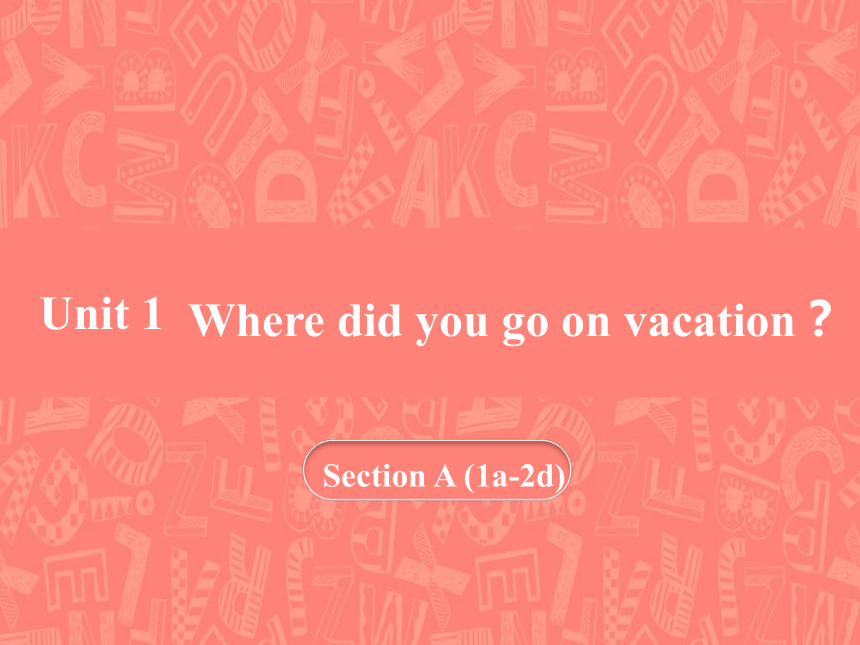 | |
| 格式 | ppt | ||
| 文件大小 | 3.5MB | ||
| 资源类型 | 教案 | ||
| 版本资源 | 人教新目标(Go for it)版 | ||
| 科目 | 英语 | ||
| 更新时间 | 2025-01-21 11:17:49 | ||
图片预览


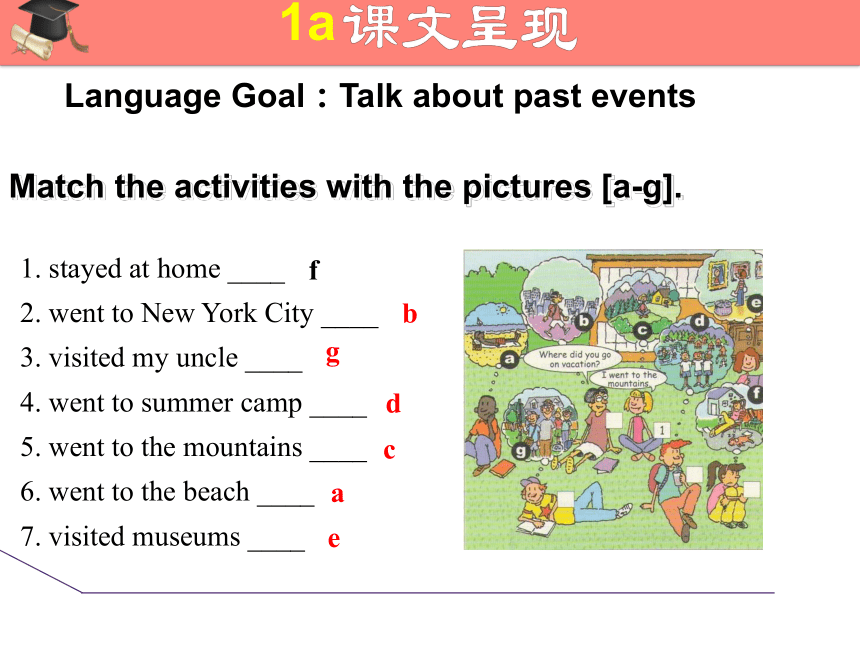

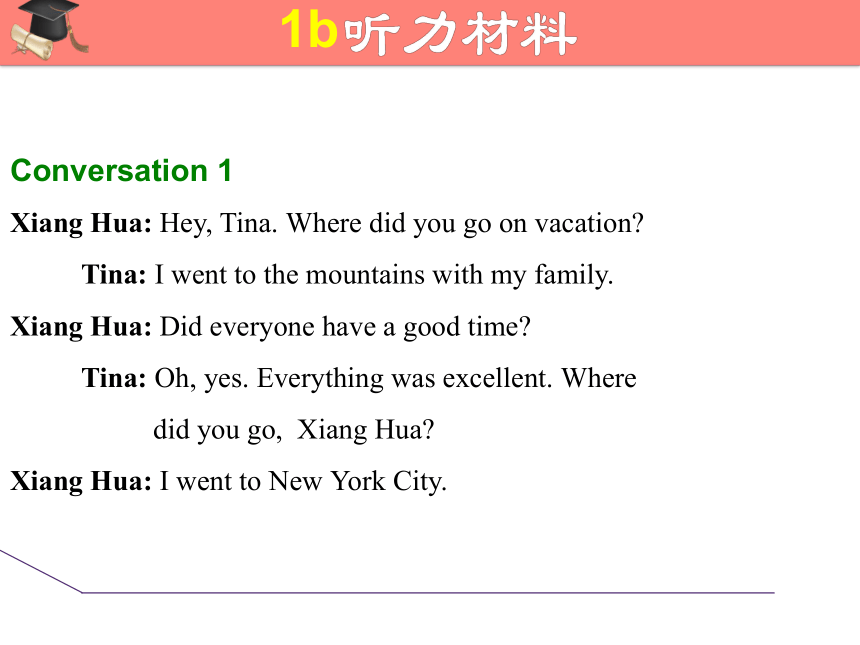
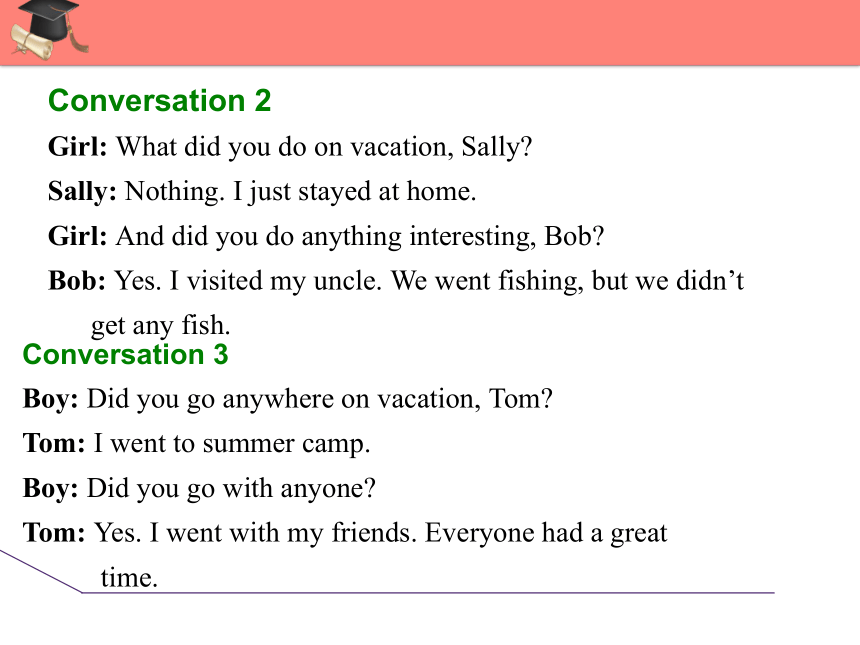
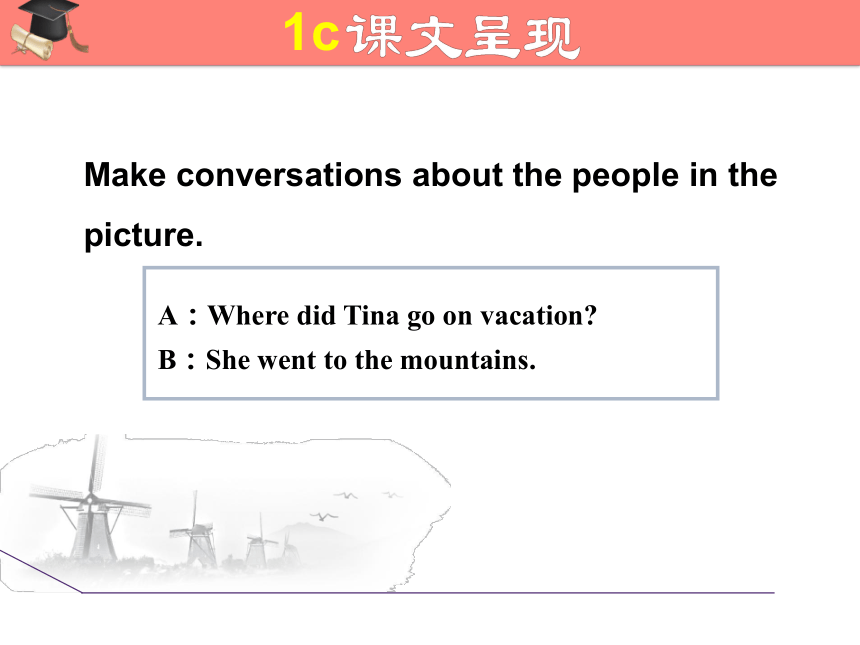
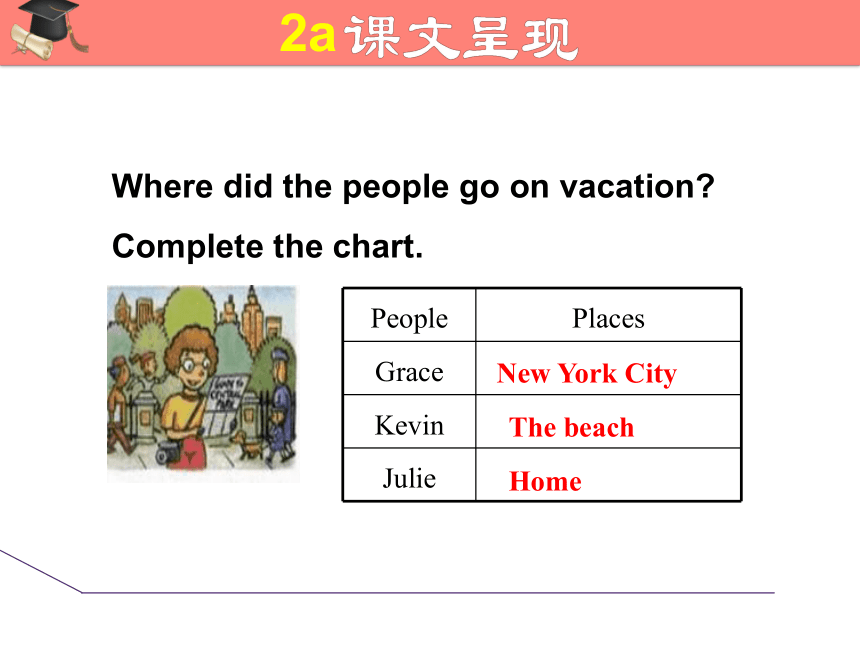
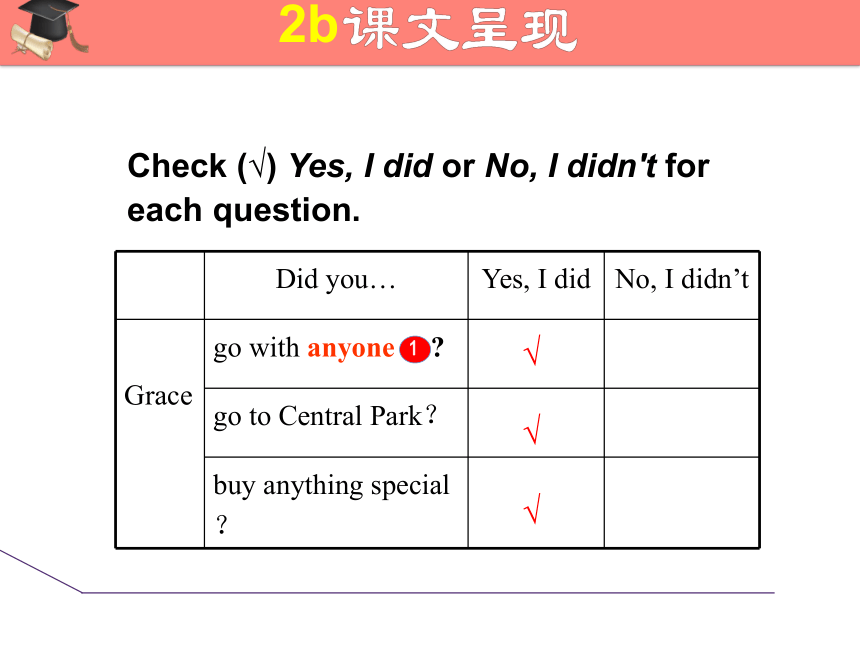
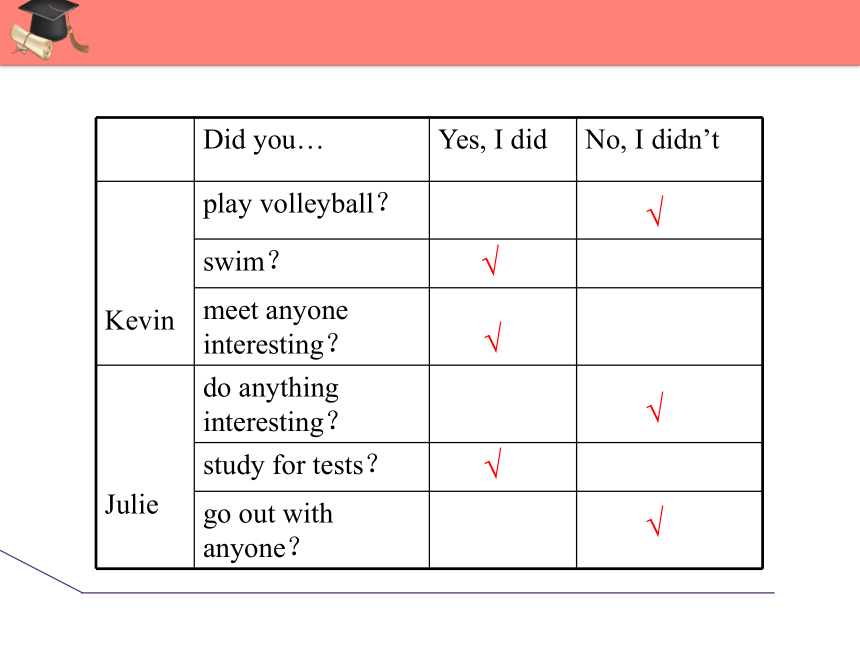
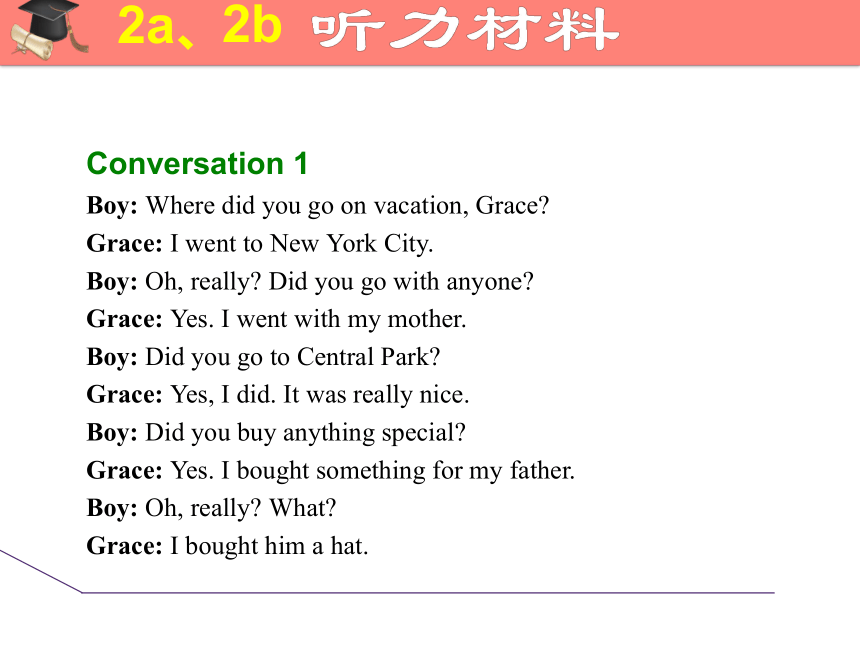
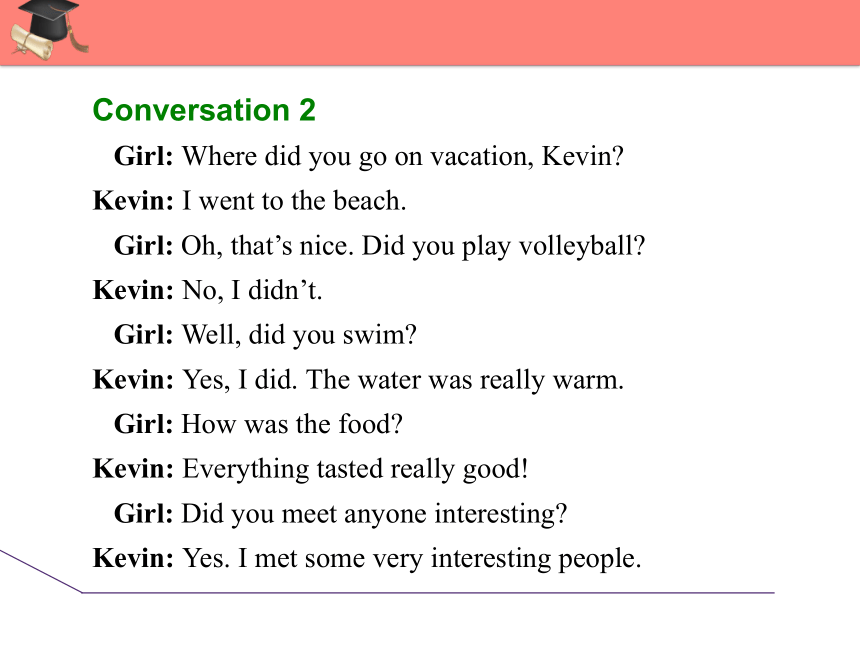
文档简介
(共47张PPT)
Where did you go on vacation?
Unit 1
Section A (1a-2d)
I went to summer camp.
I went to the mountains.
I went to New York City.
Where did you go on vacation?
1. stayed at home ____
2. went to New York City ____
3. visited my uncle ____
4. went to summer camp ____
5. went to the mountains ____
6. went to the beach ____
7. visited museums ____
Match the activities with the pictures [a-g].
1a
f
b
g
d
c
a
e
Language Goal:Talk about past events
Number the people in the
picture[1-5].
1b
1.Tina
2.Xiang Hua
3.Sally
4.Bob
5.Tom
2
3
4
5
1b
Conversation 1
Xiang Hua: Hey, Tina. Where did you go on vacation
Tina: I went to the mountains with my family.
Xiang Hua: Did everyone have a good time
Tina: Oh, yes. Everything was excellent. Where
did you go, Xiang Hua
Xiang Hua: I went to New York City.
Conversation 2
Girl: What did you do on vacation, Sally
Sally: Nothing. I just stayed at home.
Girl: And did you do anything interesting, Bob
Bob: Yes. I visited my uncle. We went fishing, but we didn’t get any fish.
Conversation 3
Boy: Did you go anywhere on vacation, Tom
Tom: I went to summer camp.
Boy: Did you go with anyone
Tom: Yes. I went with my friends. Everyone had a great
time.
1c
Make conversations about the people in the picture.
2
A:Where did Tina go on vacation
B:She went to the mountains.
2a
Where did the people go on vacation Complete the chart.
1
People Places
Grace
Kevin
Julie
New York City
The beach
Home
2b
Check (√) Yes, I did or No, I didn't for each question.
Did you… Yes, I did No, I didn’t
Grace go with anyone
go to Central Park?
buy anything special?
1
√
√
√
Did you… Yes, I did No, I didn’t
Kevin play volleyball?
swim?
meet anyone interesting?
Julie do anything interesting?
study for tests?
go out with anyone?
√
√
√
√
√
√
Conversation 1
Boy: Where did you go on vacation, Grace
Grace: I went to New York City.
Boy: Oh, really Did you go with anyone
Grace: Yes. I went with my mother.
Boy: Did you go to Central Park
Grace: Yes, I did. It was really nice.
Boy: Did you buy anything special
Grace: Yes. I bought something for my father.
Boy: Oh, really What
Grace: I bought him a hat.
2a、
2b
Conversation 2
Girl: Where did you go on vacation, Kevin
Kevin: I went to the beach.
Girl: Oh, that’s nice. Did you play volleyball
Kevin: No, I didn’t.
Girl: Well, did you swim
Kevin: Yes, I did. The water was really warm.
Girl: How was the food
Kevin: Everything tasted really good!
Girl: Did you meet anyone interesting
Kevin: Yes. I met some very interesting people.
Conversation 3
Boy: Where did you go on your vacation, Julie
Julie: I stayed at home.
Boy: Oh. So, did you do anything interesting
Julie: No, I didn’t.
Boy: Did you study for your tests
Julie: Yes, I did.
Boy: Did you go out with anyone
Julie: No. No one was here. Everyone was on vacation.
(高频)anyone /'eniw n/ pron. 任何人
eg: Is anyone here?有人在吗?
考向一
【辨析】anyone与someone
这两个复合不定代词作主语时,谓语动词用单数,区别如下:
知识点
1
anyone 与anybody相同,意为“任何人”,
常用于疑问句和否定句中。
someone 意为“某个人”,常用于肯定句中。
eg:Did anyone call me just now
刚才有人给我打过电话吗?
Someone is knocking at the door.有人在敲门。
注意
当anyone/anybody表示“任何人”时,可用于
肯定句。
eg:I can do it if anyone can.
如果有谁能干这事,我也能。
Anyone can come here to attend the party.
任何人都可以来这儿参加宴会。
形容词修饰anyone, someone, anything, something等不定代词时,形容词要后置。
eg:Did you see anyone interesting
你见过有趣的人吗?
考向二
典例 1
I didn't find ________in the classroom.
A.someone B.any one of
C.some one D.anyone
本句是否定句,故排除A、C两项;any one of
不可单独使用,故也排除。
D
典例 2
I didn't meet ______ there.
A.someone important
B.anyone important
C.important someone
D.important anyone
浏览题干可知是否定句,故用anyone。形容词修饰anyone时,应放在其后。
B
2c
Role play conversations between Grace,
Kevin and Julie.
A:Grace, where did you go on vacation
B:I went to New York City.
A:Oh, really Did you go with anyone
B:Yes, I went with my mother.
2d
Role-play the conversation.
Rick: Hi, Helen. Long time no see.
Helen:Hi, Rick. Yes, I was on vacation
last month.
Rick:Oh, did you go anywhere
interesting
Helen:Yes, I went to Guizhou with my family.
Rick: Wow! Did you see Huangguoshu Waterfall?
2
2
3
Helen:Yes, I did. It was wonderful ! We took quite a few photos there. What about you Did you do anything special last month
Rick:Not really. I just stayed at home most of the time to read and relax.
5
4
6
Long time no see. 好久不见。
用于口语中,本不符合英语语法习惯。但它简单明了,已经成为标准英语口语。此句话用于交际用语中,是老朋友好久不见时的寒暄语。
eg:Hi, Zhang Ming. Long time no see.
嗨,张明,好久不见。
知识点
2
anywhere /'eniwe / adv.在任何地方
eg: I can't see it anywhere.我哪儿也见不到它。
考向一【重点】
知识点
3
anywhere 意为“在任何地方”。常用于否定句和疑问句中。
somewhere 意为“在某处”,常用于肯定句中。
辨析anywhere, somewhere,everywhere与nowhere
everywhere 意为“到处;各个地方”,相当于here and there。
nowhere 意为“无处,哪里都不”,表示否定意义。
eg:Are you going anywhere tonight
今晚你要去什么地方吗?
I think I saw it somewhere.
我想我在某个地方见过它。
—Where did you go when you were living in that city
当你在那座城市住的时候,你都去哪儿了?
—Everywhere.哪儿都去了。
典例 1
Her mother told her to put it__________
(在某地) safe and she did it. (武威)
她母亲让她把它放到安全的地方,她这样做了。
somewhere在某地。
somewhere
典例 2
I want to go somewhere quiet for my vacation.
(改为一般疑问句)(乌鲁木齐)
________you want to go _________quiet for your vacation
一般现在时态中含有实义动词的陈述句变一般疑问句借助于助动词do,somewhere变anywhere。
Do
anywhere
当形容词修饰anywhere,somewhere或nowhere等词时,形容词要后置。
eg:We went somewhere beautiful yesterday.
昨天我们去了一个美丽的地方。
考向二
典例
—Where would you like to go on vacation,
Lily
—It's hot here. I'd like to go ______.
(凉山)
A. anywhere cool B.cool somewhere
C. somewhere cool
形容词修饰somewhere, anywhere等词时要放在它们的后面,somewhere一般用在肯定句中,anywhere
一般用在否定句和疑问句中。
C
wonderful /'w nd (r)fl/ adj.精彩的;
绝妙的;令人高兴的
知识点
考向
wonderful为形容词,可作表语或定语,意为“精彩的;绝妙的;令人愉快的”。
eg:It's wonderful to see you again!
再次见到你真叫人高兴!
That's a wonderful performance.
那是场精彩的表演。
4
eg:We had a wonderful time last night.
我们昨晚过得非常愉快。
口语中表达“太好/棒了!”我们还可用That's
good! 或That's great! 等。
典例
—There'll be a film tonight.
—________! Let's go to the cinema together.
A.Take it easy B.What a shame
C.With pleasure D.Wonderful
本题用交际法。Take it easy别急;What a shame真遗憾;With pleasure很乐意;wonderful好极了。句意:——今晚有一场电影。——好极了!咱们一起去看电影吧。
D
拓展
quite a few 相当多;不少
知识点
考向一【重点】
5
quite a few多用于口语中,相当于
many,其后谓语动词用复数。
eg:Quite a few students go to school by bike.
相当多的学生骑自行车上学。
quite作副词,表示“颇;相当”,可以修饰动词、形容词或副词。当它同形容词连用修饰可数名词单数时,quite一般置于冠词a或an之前。
eg:I quite like reading.我很喜欢阅读。
考向二
典例
完成句子:
去年我交了许多朋友。
I made________ ________ ________friends last year. ________ ________ ________
quite a few
a lot of
考向三【重点】
含义及用法 例句
little 不多的。修饰不可数
名词,表示否定意义。 There is little water
in the cup.杯子里几
乎没有水。
小的。修饰名词。 There is a little bird
by the river.
河边有一只小鸟。
few 很少;不多。修饰可数名词复数。表示否定意义。 There are few people
in the cinema.电影院
里几乎没有人。
辨析little,few,a little与a few
a little 一些。修饰不可数名词,表示肯定意义,相当于some。 There is a little water
in the cup.
杯子里有一些水。
a few 一些;几个。修饰可数名词复数,表示肯定意义,相当于some。 There are a few
people in the cinema.
电影院里有一些人。
典例
—Would you like some more noodles, Celia
—Yes, just ________, please.
A.a few B.few
C.a little D.little
本题用寻找题眼法。句意:——西莉亚,你还想要一些面条吗?——要,请来一些吧。问句中的noodles是可数名词的复数形式,a few 表示肯定,意为“一些”,修饰或代替可数名词复数形式。
A
most of the time大部分时间
知识点
考向【重点】
6
拓展一【难点】
most of the time意为“大部分时间”,
其中most为代词,意为“大多数;几乎所有”。
eg:It's noisy here most of the time.
这儿大部分时间都很喧闹。
most of... 意为“……中的大多数”,它作主语时,谓语动词的单复数形式取决于most of后的名词或者代词。
most用作形容词,意为“大多数的;大部分的”。
eg:Most children like playing football very
much.大部分的孩子非常喜欢踢足球。
eg:Most of us are going to the park.
我们大多数人要去公园。
Most of the food goes bad.
大部分的食物都变质了。
拓展二
典例
______ don't like their children to play computer games too much.
A.most parents B.most of the parents
C.Most parents D.Most the parent
根据句首单词首字母要大写可排除A、B两项;D项中的parent应用复数形式且Most后应加of,故排除。句意为:大多数家长不喜欢他们的孩子玩太多电脑游戏。
C
一、根据句意及首字母提示完成单词
1.Did you go out with a_______?
2.—I think this is a w_________ basketball match.
—You are right.
3.Many people saw the poor man, but f____ of them
gave him money.
4.M ____ students like to listen to pop music and they
don't like jazz music.
5.Nobody stayed at home, because e________ was
on vacation.
onderful
ew
nyone
ost
veryone
二、单项选择
6.There is ______juice in the fridge.Let's go and buy some.
A.few B.a few
C.little D.a little
C
用语境判断法解题。由Let's go and buy some.和
little+不可数名词可知选C。
7.—There is someone knocking at the door.
—It must be the computer repairman.I _______him to
come to fix my computer.
A.call B.have called
C.called D.will call
C
用语法判定法解题。句意:——有人在敲门。
——一定是电脑维修人员。我给他打电话让他来修理
我的电脑。因此先打电话,然后维修人员来,故此处用
一 般过去时,故为called,故选C。
8.—Have you ever climbed Mount Tai, Carol?
—Yes, I_______in Taian for a week last year and
reached the top of it twice.
A.had stayed B.stay
C.stayed D.have stayed
C
句意:——卡罗尔,你曾经爬过泰山吗?
——是的,去年我在泰安呆过一周,到过山顶两次。
last year “去年”,是一般过去时的标志,故选C。
9.—Where did she go on vacation?
—She________.
A.stays at home B.went New York City
C.went to the beach D.visits her uncle
C
用语法判定法解题。问句是一般过去时,答句也要用一般过去时,又因为go to +地点,故选C。
10. Did Daming meet_______this morning?
A. someone interesting B. interesting someone
C. interesting anyone D. anyone interesting
D
形容词修饰不定代词要后置,问句用anyone。
故选D。
三、用括号中所给单词的适当形式填空
11.How________(be) your trip to London?
12.Did Grace________(go) with her best friend?
13.I________(visit) my friends last Friday.
14.Did Julie go out with________(someone)on
her vacation?
15.I didn't go _________(somewhere)last weekend.
was
go
visited
anyone
anywhere
本节课主要练习了听力,学习了知识点
anyone, Long time no see., anywhere, wonderful, quite a few, 以及most of the time的用法。
1.熟记本课时的词汇
2.完成本课时的课后作业
Where did you go on vacation?
Unit 1
Section A (1a-2d)
I went to summer camp.
I went to the mountains.
I went to New York City.
Where did you go on vacation?
1. stayed at home ____
2. went to New York City ____
3. visited my uncle ____
4. went to summer camp ____
5. went to the mountains ____
6. went to the beach ____
7. visited museums ____
Match the activities with the pictures [a-g].
1a
f
b
g
d
c
a
e
Language Goal:Talk about past events
Number the people in the
picture[1-5].
1b
1.Tina
2.Xiang Hua
3.Sally
4.Bob
5.Tom
2
3
4
5
1b
Conversation 1
Xiang Hua: Hey, Tina. Where did you go on vacation
Tina: I went to the mountains with my family.
Xiang Hua: Did everyone have a good time
Tina: Oh, yes. Everything was excellent. Where
did you go, Xiang Hua
Xiang Hua: I went to New York City.
Conversation 2
Girl: What did you do on vacation, Sally
Sally: Nothing. I just stayed at home.
Girl: And did you do anything interesting, Bob
Bob: Yes. I visited my uncle. We went fishing, but we didn’t get any fish.
Conversation 3
Boy: Did you go anywhere on vacation, Tom
Tom: I went to summer camp.
Boy: Did you go with anyone
Tom: Yes. I went with my friends. Everyone had a great
time.
1c
Make conversations about the people in the picture.
2
A:Where did Tina go on vacation
B:She went to the mountains.
2a
Where did the people go on vacation Complete the chart.
1
People Places
Grace
Kevin
Julie
New York City
The beach
Home
2b
Check (√) Yes, I did or No, I didn't for each question.
Did you… Yes, I did No, I didn’t
Grace go with anyone
go to Central Park?
buy anything special?
1
√
√
√
Did you… Yes, I did No, I didn’t
Kevin play volleyball?
swim?
meet anyone interesting?
Julie do anything interesting?
study for tests?
go out with anyone?
√
√
√
√
√
√
Conversation 1
Boy: Where did you go on vacation, Grace
Grace: I went to New York City.
Boy: Oh, really Did you go with anyone
Grace: Yes. I went with my mother.
Boy: Did you go to Central Park
Grace: Yes, I did. It was really nice.
Boy: Did you buy anything special
Grace: Yes. I bought something for my father.
Boy: Oh, really What
Grace: I bought him a hat.
2a、
2b
Conversation 2
Girl: Where did you go on vacation, Kevin
Kevin: I went to the beach.
Girl: Oh, that’s nice. Did you play volleyball
Kevin: No, I didn’t.
Girl: Well, did you swim
Kevin: Yes, I did. The water was really warm.
Girl: How was the food
Kevin: Everything tasted really good!
Girl: Did you meet anyone interesting
Kevin: Yes. I met some very interesting people.
Conversation 3
Boy: Where did you go on your vacation, Julie
Julie: I stayed at home.
Boy: Oh. So, did you do anything interesting
Julie: No, I didn’t.
Boy: Did you study for your tests
Julie: Yes, I did.
Boy: Did you go out with anyone
Julie: No. No one was here. Everyone was on vacation.
(高频)anyone /'eniw n/ pron. 任何人
eg: Is anyone here?有人在吗?
考向一
【辨析】anyone与someone
这两个复合不定代词作主语时,谓语动词用单数,区别如下:
知识点
1
anyone 与anybody相同,意为“任何人”,
常用于疑问句和否定句中。
someone 意为“某个人”,常用于肯定句中。
eg:Did anyone call me just now
刚才有人给我打过电话吗?
Someone is knocking at the door.有人在敲门。
注意
当anyone/anybody表示“任何人”时,可用于
肯定句。
eg:I can do it if anyone can.
如果有谁能干这事,我也能。
Anyone can come here to attend the party.
任何人都可以来这儿参加宴会。
形容词修饰anyone, someone, anything, something等不定代词时,形容词要后置。
eg:Did you see anyone interesting
你见过有趣的人吗?
考向二
典例 1
I didn't find ________in the classroom.
A.someone B.any one of
C.some one D.anyone
本句是否定句,故排除A、C两项;any one of
不可单独使用,故也排除。
D
典例 2
I didn't meet ______ there.
A.someone important
B.anyone important
C.important someone
D.important anyone
浏览题干可知是否定句,故用anyone。形容词修饰anyone时,应放在其后。
B
2c
Role play conversations between Grace,
Kevin and Julie.
A:Grace, where did you go on vacation
B:I went to New York City.
A:Oh, really Did you go with anyone
B:Yes, I went with my mother.
2d
Role-play the conversation.
Rick: Hi, Helen. Long time no see.
Helen:Hi, Rick. Yes, I was on vacation
last month.
Rick:Oh, did you go anywhere
interesting
Helen:Yes, I went to Guizhou with my family.
Rick: Wow! Did you see Huangguoshu Waterfall?
2
2
3
Helen:Yes, I did. It was wonderful ! We took quite a few photos there. What about you Did you do anything special last month
Rick:Not really. I just stayed at home most of the time to read and relax.
5
4
6
Long time no see. 好久不见。
用于口语中,本不符合英语语法习惯。但它简单明了,已经成为标准英语口语。此句话用于交际用语中,是老朋友好久不见时的寒暄语。
eg:Hi, Zhang Ming. Long time no see.
嗨,张明,好久不见。
知识点
2
anywhere /'eniwe / adv.在任何地方
eg: I can't see it anywhere.我哪儿也见不到它。
考向一【重点】
知识点
3
anywhere 意为“在任何地方”。常用于否定句和疑问句中。
somewhere 意为“在某处”,常用于肯定句中。
辨析anywhere, somewhere,everywhere与nowhere
everywhere 意为“到处;各个地方”,相当于here and there。
nowhere 意为“无处,哪里都不”,表示否定意义。
eg:Are you going anywhere tonight
今晚你要去什么地方吗?
I think I saw it somewhere.
我想我在某个地方见过它。
—Where did you go when you were living in that city
当你在那座城市住的时候,你都去哪儿了?
—Everywhere.哪儿都去了。
典例 1
Her mother told her to put it__________
(在某地) safe and she did it. (武威)
她母亲让她把它放到安全的地方,她这样做了。
somewhere在某地。
somewhere
典例 2
I want to go somewhere quiet for my vacation.
(改为一般疑问句)(乌鲁木齐)
________you want to go _________quiet for your vacation
一般现在时态中含有实义动词的陈述句变一般疑问句借助于助动词do,somewhere变anywhere。
Do
anywhere
当形容词修饰anywhere,somewhere或nowhere等词时,形容词要后置。
eg:We went somewhere beautiful yesterday.
昨天我们去了一个美丽的地方。
考向二
典例
—Where would you like to go on vacation,
Lily
—It's hot here. I'd like to go ______.
(凉山)
A. anywhere cool B.cool somewhere
C. somewhere cool
形容词修饰somewhere, anywhere等词时要放在它们的后面,somewhere一般用在肯定句中,anywhere
一般用在否定句和疑问句中。
C
wonderful /'w nd (r)fl/ adj.精彩的;
绝妙的;令人高兴的
知识点
考向
wonderful为形容词,可作表语或定语,意为“精彩的;绝妙的;令人愉快的”。
eg:It's wonderful to see you again!
再次见到你真叫人高兴!
That's a wonderful performance.
那是场精彩的表演。
4
eg:We had a wonderful time last night.
我们昨晚过得非常愉快。
口语中表达“太好/棒了!”我们还可用That's
good! 或That's great! 等。
典例
—There'll be a film tonight.
—________! Let's go to the cinema together.
A.Take it easy B.What a shame
C.With pleasure D.Wonderful
本题用交际法。Take it easy别急;What a shame真遗憾;With pleasure很乐意;wonderful好极了。句意:——今晚有一场电影。——好极了!咱们一起去看电影吧。
D
拓展
quite a few 相当多;不少
知识点
考向一【重点】
5
quite a few多用于口语中,相当于
many,其后谓语动词用复数。
eg:Quite a few students go to school by bike.
相当多的学生骑自行车上学。
quite作副词,表示“颇;相当”,可以修饰动词、形容词或副词。当它同形容词连用修饰可数名词单数时,quite一般置于冠词a或an之前。
eg:I quite like reading.我很喜欢阅读。
考向二
典例
完成句子:
去年我交了许多朋友。
I made________ ________ ________friends last year. ________ ________ ________
quite a few
a lot of
考向三【重点】
含义及用法 例句
little 不多的。修饰不可数
名词,表示否定意义。 There is little water
in the cup.杯子里几
乎没有水。
小的。修饰名词。 There is a little bird
by the river.
河边有一只小鸟。
few 很少;不多。修饰可数名词复数。表示否定意义。 There are few people
in the cinema.电影院
里几乎没有人。
辨析little,few,a little与a few
a little 一些。修饰不可数名词,表示肯定意义,相当于some。 There is a little water
in the cup.
杯子里有一些水。
a few 一些;几个。修饰可数名词复数,表示肯定意义,相当于some。 There are a few
people in the cinema.
电影院里有一些人。
典例
—Would you like some more noodles, Celia
—Yes, just ________, please.
A.a few B.few
C.a little D.little
本题用寻找题眼法。句意:——西莉亚,你还想要一些面条吗?——要,请来一些吧。问句中的noodles是可数名词的复数形式,a few 表示肯定,意为“一些”,修饰或代替可数名词复数形式。
A
most of the time大部分时间
知识点
考向【重点】
6
拓展一【难点】
most of the time意为“大部分时间”,
其中most为代词,意为“大多数;几乎所有”。
eg:It's noisy here most of the time.
这儿大部分时间都很喧闹。
most of... 意为“……中的大多数”,它作主语时,谓语动词的单复数形式取决于most of后的名词或者代词。
most用作形容词,意为“大多数的;大部分的”。
eg:Most children like playing football very
much.大部分的孩子非常喜欢踢足球。
eg:Most of us are going to the park.
我们大多数人要去公园。
Most of the food goes bad.
大部分的食物都变质了。
拓展二
典例
______ don't like their children to play computer games too much.
A.most parents B.most of the parents
C.Most parents D.Most the parent
根据句首单词首字母要大写可排除A、B两项;D项中的parent应用复数形式且Most后应加of,故排除。句意为:大多数家长不喜欢他们的孩子玩太多电脑游戏。
C
一、根据句意及首字母提示完成单词
1.Did you go out with a_______?
2.—I think this is a w_________ basketball match.
—You are right.
3.Many people saw the poor man, but f____ of them
gave him money.
4.M ____ students like to listen to pop music and they
don't like jazz music.
5.Nobody stayed at home, because e________ was
on vacation.
onderful
ew
nyone
ost
veryone
二、单项选择
6.There is ______juice in the fridge.Let's go and buy some.
A.few B.a few
C.little D.a little
C
用语境判断法解题。由Let's go and buy some.和
little+不可数名词可知选C。
7.—There is someone knocking at the door.
—It must be the computer repairman.I _______him to
come to fix my computer.
A.call B.have called
C.called D.will call
C
用语法判定法解题。句意:——有人在敲门。
——一定是电脑维修人员。我给他打电话让他来修理
我的电脑。因此先打电话,然后维修人员来,故此处用
一 般过去时,故为called,故选C。
8.—Have you ever climbed Mount Tai, Carol?
—Yes, I_______in Taian for a week last year and
reached the top of it twice.
A.had stayed B.stay
C.stayed D.have stayed
C
句意:——卡罗尔,你曾经爬过泰山吗?
——是的,去年我在泰安呆过一周,到过山顶两次。
last year “去年”,是一般过去时的标志,故选C。
9.—Where did she go on vacation?
—She________.
A.stays at home B.went New York City
C.went to the beach D.visits her uncle
C
用语法判定法解题。问句是一般过去时,答句也要用一般过去时,又因为go to +地点,故选C。
10. Did Daming meet_______this morning?
A. someone interesting B. interesting someone
C. interesting anyone D. anyone interesting
D
形容词修饰不定代词要后置,问句用anyone。
故选D。
三、用括号中所给单词的适当形式填空
11.How________(be) your trip to London?
12.Did Grace________(go) with her best friend?
13.I________(visit) my friends last Friday.
14.Did Julie go out with________(someone)on
her vacation?
15.I didn't go _________(somewhere)last weekend.
was
go
visited
anyone
anywhere
本节课主要练习了听力,学习了知识点
anyone, Long time no see., anywhere, wonderful, quite a few, 以及most of the time的用法。
1.熟记本课时的词汇
2.完成本课时的课后作业
同课章节目录
- Unit 1 Where did you go on vacation?
- Section A
- Section B
- Unit 2 How often do you exercise?
- Section A
- Section B
- Unit 3 I'm more outgoing than my sister.
- Section A
- Section B
- Unit 4 What's the best movie theater?
- Section A
- Section B
- Unit 5 Do you want to watch a game show?
- Section A
- Section B
- Unit 6 I'm going to study computer science.
- Section A
- Section B
- Unit 7 Will people have robots?
- Section A
- Section B
- Unit 8 How do you make a banana milk shake?
- Section A
- Section B
- Unit 9 Can you come to my party?
- Section A
- Section B
- Unit 10 If you go to the party, you'll have a grea
- Section A
- Section B
